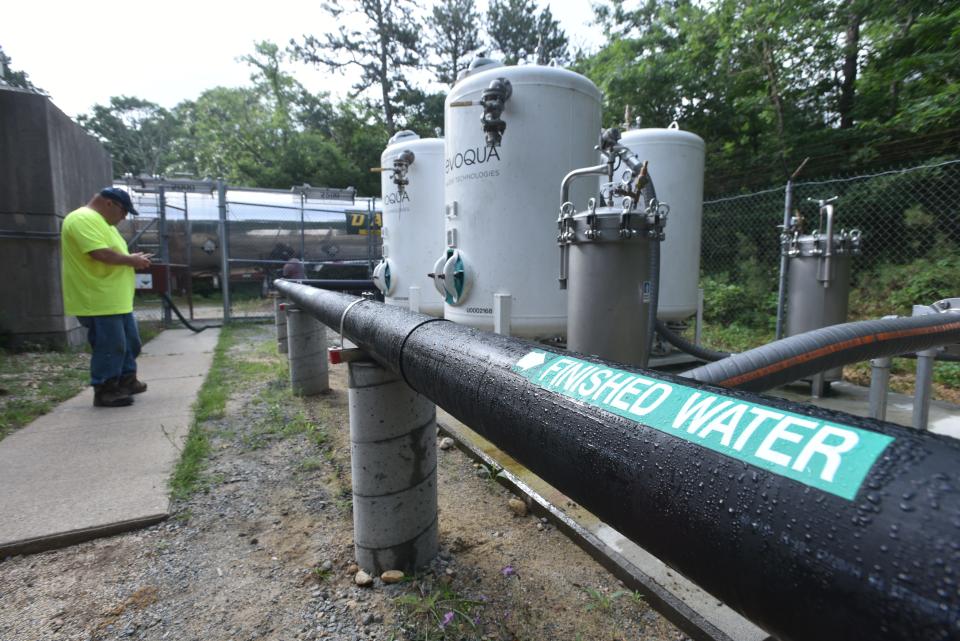Fresh Pond town well in Falmouth reopened as part of Air Force base cleanup dating from 1970s
FALMOUTH — The Fresh Pond municipal well, which provides half a million gallons of drinking water to the town per day, is back up and running after five years of being shut down due to contamination.
The treatment of the Fresh Pond municipal well and the connection of four homes to municipal water is part of a project that aimed to connect eight residences in Mashpee and Falmouth to municipal water and treat three municipal wells.
The town of Falmouth shut down the municipal well in 2017 when it was found that it was contaminated with perchlorate.

Perchlorate is a chemical that can interfere with the functioning of the thyroid, according to the Food and Drug Administration.
However, it was also found in 2019 that the well was contaminated with PFAS from the Joint Base, a man-made chemical that can be harmful to human health.
The Air Force Civil Engineer Center at Joint Base Cape Cod recently announced the completion of PFAS treatment to the Fresh Pond well. Additionally, the perchlorate has been treated by the town, said Falmouth Water Superintendent Cathal O’Brien.
"We worked on it for several years. It just took a while to get done," said O'Brien.
The Fresh Pond well provides half a million gallons of drinking water to the town, which gets mixed in with water from all of the other municipal wells, said O'Brien. There are four municipal wells in Falmouth which serve over 20,000 homes, he said.
More: Keating: Air Force agrees to pay for PFAS cleanups in Mashpee and Falmouth wells
In September 2021, the Air Force agreed it would pay for the cleanup of three municipal wells, as well as private wells, in Falmouth and Mashpee. The agreement was a result of work by U.S. Rep. William Keating, D-Mass., and Sen. Edward Markey, D-Mass.
Water District Manager Andrew Marks told the Times in September 2021 Mashpee had been having a tough time getting through the summer without the municipal wells on Turner Road being down. The two Turner Road wells in Mashpee are also a part of the current cleanup project.
The Air Force Civil Engineer Center also announced it had disconnected four homes from private wells contaminated with PFAS and connected them to a municipal water main.
More: Pickleball fatigue: Fun for players, stressful for neighbors
The Air Force Center Community Involvement Lead Douglas Karson declined to identify the owners of the affected homes, citing privacy concerns.
Now that the municipal well is back online, the town will have more drinking water in reserve, said O’Brien.
How did the municipal and private wells become contaminated?
The town still doesn’t know where the perchlorate contamination came from, said O’Brien.
Perchlorate can occur naturally, but it can also be manufactured and is used in things like rocket propellant, explosives, fireworks, and road flares, according to the EPA.
The PFAS contamination came from the use of firefighting foam on Joint Base Cape Cod at an area known as Fire Training Area 1.
Contamination from Fire Training Area 1 was previously referred to as the Ashumet Valley Plume, according to Rose Forbes, Air Force remediation program manager at Joint Base Cape Cod.
More: Hyannis Fire joins Fall River and Nantucket in PFAS study
The Ashumet Valley Plume was discovered in the 1970s, and the Air Force began its cleanup efforts in 1997.
The type of foam that causes PFAS contamination in drinking water is no longer used for firefighter training, said Forbes. However, the military still uses it, she said. The foam used is to deal with fire on military aircraft.
Currently, there is no substitute for the foam for military aircraft, though in the future there is likely to be one, said Forbes.
Private wells using bottled water for drinking
People living in the four homes were connected to the municipal water main and disconnected from their private wells had been drinking bottled water provided by the Air Force, said Forbes. However, they were still able to shower with the PFAS contaminated water, since there is no risk to skin, she said.
More: PFAS contamination: Of 21 Barnstable ponds tested, 21 had contaminants, town report finds
The Air Force has connected 123 private wells in Falmouth, Mashpee, and Bourne, to municipal water so far, said Forbes. The private wells remain contaminated, though they are no longer connected to the homes.
What’s next?
So far, the Air Force has completed connecting all eight homes to municipal water and has treated the Fresh Pond municipal well in Falmouth. Two municipal wells in Mashpee still need treatment, which will be completed by October.
Regulatory boards are reviewing the results of the probe of Fire Training Area 1, said Forbes. The Air Force is working on a feasibility study to clean up the contaminated groundwater, she said.
This article originally appeared on Cape Cod Times: Falmouth's Fresh Pond town well reopens as part of Air Force cleanup

